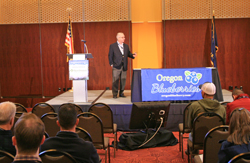Consumer Demands Offer Opportunity
Food safety protocols, sustainable certification and other requirements of 21st Century blueberry production are no doubt challenging, noted Carl Casale of Ospraie Ag Science.
They also represent an opportunity.
 |
Carl Casale speaks to participants of the 2019 Oregon Blueberry Conference. |
In a presentation at the 2019 Oregon Blueberry Conference, Casale said consumer demands are forcing a transformation in agricultural production that ultimately could benefit farmers.
“We are going to have to pivot and cater to a consumer that is going to be a lot more demanding about how we grow what we grow,” he said. “I think that creates opportunities.”
Casale, a former CEO of CHS and CFO of Monsanto, is based in West St. Paul, Minnesota, and owns a blueberry farm just south of Portland.
“Data analytics of your carbon footprint … nutrient efficiency, precision agriculture: These are all issues or opportunities that are created for us as producers from a more demanding consumer,” Casale said. “And all these opportunities from a consumer-demand standpoint are going to force us to become more efficient because that is in essence what sustainability is.”
Adopting technologically advanced production methods, such as digital imaging to help identify heat stress in fields, ultimately will maximize returns, in this case by improving water-use conservation, Casale said, as well as meet consumer expectations.
“Technology allows us to be more judicious in terms of how we do things, and this will align with consumer desires and will lower our cost per pound produced,” he said.
In his presentation, titled “The Opportunities of Changing Consumer Expectations,” Casale said that growers will be expected to adopt technologically advanced production systems in the future. Rather than being rewarded for doing so, he said, it will be a cost of doing business.
“When I think about sustainability, I don’t see getting an extra five cents a pound,” he said. “It won’t be rewarded. It will be required. Our customers are going to demand it from us. But also, from a competitive standpoint, I think it will be required.”
The current trend on buying local will continue to drive consumer purchasing decisions, Casale said, with more emphasis placed on story agriculture. “I want to know the story and I want it to be produced as close to me as possible. For years, organic was the proxy for local from a consumer standpoint and I think that has evolved in the consumer mindset.”
Traceability will be a point of emphasis, as well. “I think transparent traceability is the emerging trend,” he said. “I think there is going to be an increasing trend to demand traceability.
“In the last romaine E. coli outbreak in the U.S. (in late 2018), it took about two weeks to figure out the source of it. That is not going to be acceptable for the future,” Casale said. “So, not only are we going to have to be very good stewards of how we produce the crop, we are going to have to be able to document and we are going to have to be able to turn pretty quickly if somebody wants some of that information back from us.
“And do I see us getting an extra five cents a pound for that?” he asked. “No. I see that as a requirement of being in business.
“So, this deal is going to change and for those who choose to adapt, I think we are going to have a very competitive industry in the Pacific Northwest and in Oregon. But we are going to have to adapt and just accept that consumers are going to want different things than what they demanded in the past,” Casale said.
“People we sell our product to are going to continue to seek out people who want to produce in a more sustainable way, because that is what their customers are going to want,” Casale said. “And if we can do that efficiently, then we will be successful long term.”
The 2020 Oregon Blueberry Conference is scheduled February 3 at the Salem Convention Center, 200 Commercial St. S.E.